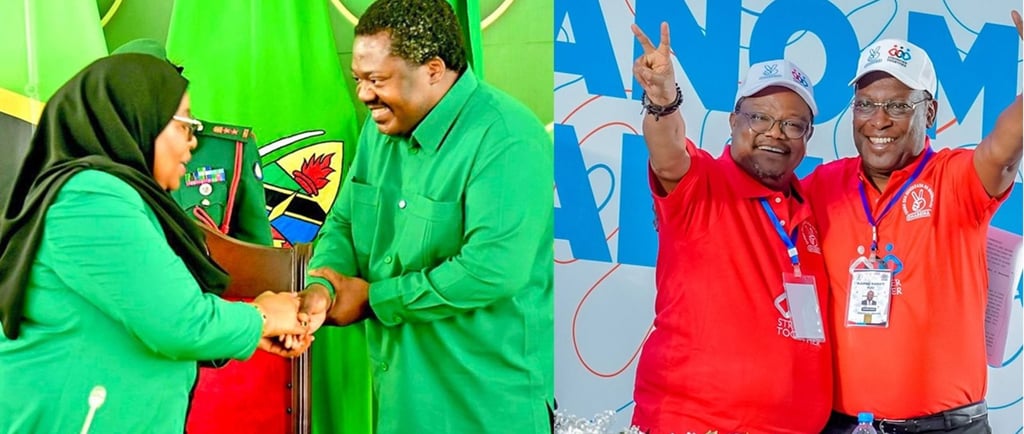A Democracy in Retreat? Tanzania's High-Stakes Election and the Fight for its Future
By Ahmed Gamal ElSayad – Political Science Researcher
10/6/20253 min read


Tanzania is at a crossroads. As the nation barrels toward its October 2025 presidential election, a period of promising political reform has given way to a chilling return to authoritarian tactics. The ruling Chama Cha Mapinduzi (CCM) party, one of Africa's longest-reigning political forces, appears determined to tighten its grip on power, sidelining its most formidable opponents and raising serious questions about the future of Tanzanian democracy.
The upcoming election is shaping up to be more than just a vote; it's a litmus test for a nation caught between a legacy of single-party dominance and the aspirations for a more open, competitive political future.
The Whims of a Political Pendulum
The current political climate is a stark reversal from the early days of President Samia Suluhu Hassan's tenure. When she took office in 2021 following the death of the notoriously authoritarian John Magufuli, there was a palpable sense of hope. President Hassan initiated a series of reforms that signaled a political thaw:
She lifted a years-long ban on opposition party rallies.
She released imprisoned opposition leaders and activists.
She eased draconian restrictions on the media.
These moves were praised at home and abroad, positioning Tanzania as a stabilizing force in East Africa. But as the 2025 election has drawn closer, the pendulum has swung back with alarming force.
The government has launched a crackdown on the main opposition party, CHADEMA, arresting hundreds of its supporters and top leaders, including presidential hopeful Tundu Lissu. This culminated in a shocking decision by the National Electoral Commission to disqualify CHADEMA from the election entirely, banning it from political activity until 2030. The official reason? The party's refusal to sign a code of conduct in protest of an electoral system it views as fundamentally rigged.
This move to sideline the most credible opposition has brought back the ghosts of the Magufuli era, transforming what should be a democratic contest into a process that many fear is designed to be a mere formality to legitimize the CCM's continued rule.
The Three Crises Facing the Election
As Tanzania heads to the polls, its democratic process is threatened by three interconnected challenges that undermine the credibility of the vote.
1. The Specter of Authoritarian Rule
The CCM's decades-long dominance has been maintained through a mix of historical legacy and, increasingly, intimidation. The exclusion of CHADEMA sends a clear message: any serious threat to the ruling party's power will not be tolerated. This heavy-handed approach erodes voter confidence and fuels cynicism, making many question the point of participating at all. Voter turnout has already been in decline, dropping from 67% in 2015 to just 51% in 2020, a trend likely to continue.
2. A Disengaged and Disenfranchised Youth
Young people make up over a third of Tanzania's population, but they are increasingly alienated from the political process. While politically active on digital platforms, their voices are often met with repression. The government has tightened cybercrime laws, fined digital content creators, and been accused of orchestrating abductions of young activists.
A 2023 Afrobarometer survey revealed a shocking statistic: only 29% of young Tanzanians believe that elections are a true expression of the popular will. This deep-seated disillusionment represents a profound crisis of legitimacy for the political system.
3. The Erosion of a Real Alternative
A democracy needs a viable opposition to function. By disqualifying its strongest challenger, the CCM has effectively neutered the political competition. While several smaller parties are still in the race, none possess the national reach or popular base of CHADEMA. This creates a political vacuum, leaving voters who are dissatisfied with the ruling party with no clear alternative to rally behind.
Two Paths Forward: What Happens in October?
Given the current political climate, the election is likely to follow one of two paths.
Scenario 1: The Status Quo Prevails (Most Likely)
With its most significant rival sidelined and its institutional grip on power secure, the victory of President Samia Suluhu Hassan and the CCM is the most probable outcome. As one of Africa's longest-serving ruling parties, the CCM has proven adept at navigating electoral challenges, and its continuation in power remains the most realistic scenario.
Scenario 2: An Unlikely Upset (A Faint Possibility)
While highly improbable, the emergence of a new political force or a unified opposition coalition that galvanizes the public cannot be entirely ruled out. Such an outcome would require a charismatic leader and a compelling message that could cut through the political repression and inspire a groundswell of support. At present, however, there are no clear signs that such a movement is on the horizon.
Conclusion: A Test of Tanzania's Soul
The October 2025 election is a pivotal moment for Tanzania. It is a test of the nation's ability to balance the desire for stability with the principles of democracy. A continuation of the current exclusionary practices will only deepen the public's distrust and political disengagement, particularly among the youth.
Conversely, a genuine opening of the political space could set the country on a more stable and democratic path. The choice Tanzania makes in this election will echo for years to come, defining not just who holds power, but what kind of nation it aspires to be.
Download full study here.
Empowerment
Amplifying African voices for sustainable progress together.
Contact US
Growth
Street No. 3281, N'Djamena, Republic of Chad.
© 2024. All rights reserved.